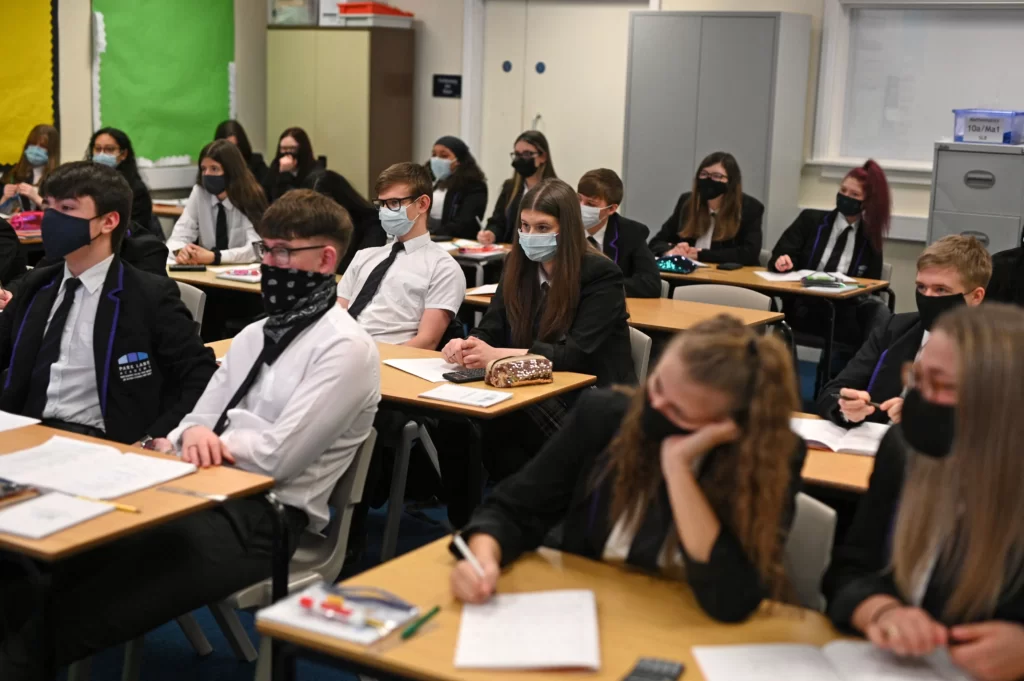Head teachers in England have labelled the recent state of absenteeism among students as very disturbing, as it has translated into bad test scores in their examinations.
According to school administrators, the attitude of abandoning examinations and absenteeism in education institutions in England, have reached the apex.
Also, head teachers have attributed the students’ failures in GCSE scores to mental illness and chronic absenteeism. Evaluations from education experts further depict that, less than 30,000 students may get top grades in England this year.

Not all, teachers claimed that, cost of living crisis, and the rigorous impact of the covid-19 pandemic on vulnerable families, have culminated into series of difficulties that school administrators have been dealing with.
As part of its plans to restore grading system to the pre-pandemic level, the government has warned that, the soon-to-be-released this year’s GCSE scores, would show a dramatic decline in performance.
According to the head teacher of Copthall School for Girls, Evelyn Ford, the academic year has not been normal, and that, they’re all expecting a return to the normal times but their plans have been hindered by the psychological state of the pupils.
“We had more students absent from exams than we’ve ever had before. We had more students walk out of an exam than we’ve ever had before. I think that’s to do with the whole stress and anxiety they are facing.
“School leaders have tried as much as we can to prepare them, but for some of them, mentally and emotionally, they just found it too much.”
Evelyn Ford, Head Teacher, Copthall Girls School.

Moreover, Evelyn Forde attributed the poor GCSE score to the high rate of students and teachers absenteeism. “Some of my girls had not had a substantive science teacher for the whole year. We’ve got three unfilled science posts,” Forde said.
“Most schools are carrying a large number of pupils who have been persistently absent and that will impact on their overall figures. The immediate concern is for the young people themselves, because they’ve not had the adjustments that previous years have.
“What we’ve seen is a significant impact on young people’s mental health and wellbeing and we think that will play out in their results. Young people who are at some kind of disadvantage because of social or family circumstances, or special education needs are more at risk, undoubtedly. A lot of schools have really struggled to do their best by their pupils because the system has worked against them. We’ve all done our absolute level best but it’s been difficult.”
Evelyn Ford, Head Teacher, Copthall Girls School.
Additionally, reports further reveal that, among students who participated in GCSE this year, one out of ten students were absent from class on a daily basis, thus, a 70% increase as compared to the pre-pandemic level.

Furthermore, the Secretary-General for Schools and Colleges Leaders, Geoff Barton asserted that, the test scores of this year’s GCSE would undoubtedly have a significant effect in the school ranking system. He added that, the problems have been beyond their purview.
“This could lead to reduced life chances for these young people and to schools serving disadvantaged communities being penalized by the government’s accountability regime.”
“The government has failed to provide young people affected by these factors with sufficient support and it has failed also to reform the school accountability system to make it less punitive and more supportive. Both things need to happen.”
Secretary-General for Schools and Colleges Leaders, Geoff Barton.

In England, grades 7 to 9 were given to 20.6% of entrants in 2019. However, because tests were abandoned under Covid-19, the percentage increased through teacher evaluation in 2021 to 28.5%, and then decreased to 26% when exams were reinstated last year.
READ ALSO: Tory Under Fire For The Decline Of Interest In School Sports





















